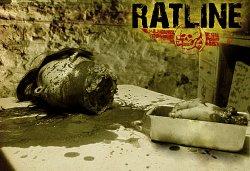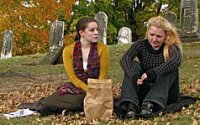|
Your new movie Ratline
- now I might have asked this one before [click
here], but bring us up to speed, what is it about?
At the core of the story is the most sacred relic
of the Nazi party, the Blood Flag, a real flag that went missing at the
end of World War 2. In our
story, the flag possesses supernatural powers, infused by the occult
experimentation of the SS Paranormal Division.
A mysterious stranger with a blood-soaked past, Frank Logan, is
getting closer to the flag's hiding place.
The
real life Nazis actually did have a certain interest in the esoteric
and paranormal. To what extent is Ratline's
background the SS Paranormal Division based on historical facts?
I
did a lot of research and pieced together the story from as many facts as
possible. As often as I could,
I used real people, places, objects, dates, and events from history.
Even the really bizarre stuff, like the ceremonies that included
decapitations, I pulled from interviews I found (though it is certainly up
for debate if those ceremonies actually took place or not).
The fictional aspects
are in how I stitched all of the facts together.
For example, the Blood Flag was real, and apparently the paranormal
experimentation was real, but there is no evidence that the Blood Flag was
ever part of those experiments.
An
underlying theme of your film seems to be the many (still) unresolved
questions of the Nazi-era and the USA's not always too fortunate way of
dealing with them. Would you like to elaborate on that?
In
writing the story, Jason Christ and I knew that we wanted to explore moral
ambiguity and keep our characters from falling neatly into good-guy and
bad-guy categories. It was
easy to connect this with World War 2.
Both the Allies and the Axis committed loathsome, grisly acts.
It is impossible to view the Nuremburg Trials without noting some
hypocrisy. America was in
pursuit of justice - fighting to topple foes that needed to be defeated
for the betterment of the world. However,
Hitler too had some motivations for what he did that could be considered
honorable. To paint these
rivals as white and black, pure good versus pure evil, is naive.
I was very interested in letting that moral gray-area influence the
writing of Ratline.
|

|
Consider
the Nazi eugenics aspect. Hitler's
widespread sterilization and killing of the infirm, then the
medicalization of his anti-Semitism, which spiraled into the holocaust,
represent the most nightmarish and chilling aftershocks of the war.
The part of the tale that history seldom reports is that Hitler was
inspired and educated by eugenics theories and practices developed in
America. The scientific base
for the Nazis building a Master Race through breeding restrictions, forced
sterilization, and mass slaughter can be traced back to American
organizations, like the Race Betterment Foundation in Michigan, The
Eugenics Records Office in New York, and The American Breeder’s
Association. Eugenics was not
a dark secret that festered underground - it was a science supported and
advanced by high profile American organizations, like The Rockefeller
Foundation and The Carnegie Institution.
The ideology was even bolstered by the U.S. Supreme Court.
Before the war, U.S. foundations helped develop and fund various
German eugenics programs, including the one that trained Josef Mengele -
the Nazi who would earn the nickname "The Angel Of Death" as he
conducted gruesome human experiments on concentration camp prisoners.
Today,
the Nazis are often seen as the trailblazers of a deplorable
pseudoscience. However, in
reality, Nazi eugenics sprang forth from American eugenics, and it was a
science embraced by many countries around the world before the end of the
war.
After
the war, the USA's handling of the Nazis is best described as
opportunistic. When a show of
power was the desired effect, we punished them severely.
Under other circumstances, when it was to the Allies' benefit, heads
were turned to look the other way. When
the USA could benefit from Nazi know-how, Nazis were completely let off
the hook, and in fact rewarded fairly generously.
And when the USA was in the position of having appeared to be too
closely aligned with the Nazis (for example, in the realm of eugenics)
those American pursuits were swept under the rug.
I'm not a USA-basher, and I believe the Second World War represents
America's finest hour. But the
conflict wasn't a comic book with heroes and villains.
It was complex, political, emotional, and ripe with error, double
standards, and back-peddling. The
good guy / bad guy line blurred dramatically.
As an artist
interested in making movies that, in addition to the fun stuff, stimulate
a few brain cells as well, I am drawn to war.
I find war fascinating in that it brings out the best and worst in
people, without letting anyone be the best or the worst.
*** SPOILER in this question/answer.
Skip if you choose. ***
In
the beginning of Ratline,
a group of Satanists is set up in quite some detail, only to then brutally
be killed off by Frank Logan in a manner of minutes. Given their diligent
character introductions, did you ever intend to give the Satanists a bigger role
in your film? And/or was the contrast between these wannabe occultists and
the methodic evil of Logan an intended effect?
The
Satanists were never intended to have bigger roles in the narrative.
From the beginning of story development, we wanted them to function
as misdirection and as an unexpected and inventive way of introducing
Logan. There are multiple
feints in Ratline and the Satanists kick this off.
Jason
Christ, who co-wrote the screenplay with me, presented the idea of the
satanic cult, and his idea was to build them up as main characters and
total scumbags so that the audience would have a stronger reaction to
Logan's introduction. Jason
wanted to see one version of evil quickly swept aside by a more powerful
evil. I really liked this
idea, and I became interested in presenting Logan as a hero, and thereby
generating some conflict in the audience.
So the Satanists were written to be as unlikable as possible.
They're dangerous, racist, white trash meth dealers who have no
respect for human or animal life - on top of just being kinda lame and
annoying. I wanted to create a
moment where the audience was essentially cheering on the "bad
guy" of the movie. This
connects back to that moral gray-area discussed above.
 |
Despite
all the atrocities he commits, Frank Logan as played by Jason Christ comes
off as rather charming (at least when he's not decapitating people). Was
this intended from square one or did his character develop only during
shooting?
I intended this from the beginning.
Logan is a wanted man. He
has had to play different identities and acclimate to different
communities in his efforts to elude capture, so we knew he had to be
smart, sometimes charming, and someone you'd feel comfortable living next
door to. I also wanted Jason
to speak and act much older than his character appears, so that
contributes to his oddly refined conduct.
Ratline
features quite a few pretty drastic outbursts of violence. Was there ever
a line you refused to cross in terms of violence and gore?
I
tend to think about violence and gore in terms of tone.
Like most other things you put on screen, violence is not confined
to single shots - it alters the whole vibe of a movie.
In creating the universe of one movie, the tone summoned by extreme
violence may be completely inappropriate.
For other films, violence is an essential color on the palette in
generating the tone a director wants the movie to have.
To
create the tone I wanted Ratline
to have, I decided early on that the more
violence and gore I could work into the movie, the better.
(And on a limited budget, that was a challenge.)
The only line I didn't want to cross was lingering on the gore or
letting the movie wallow in it to the point where something stopped
looking realistic. When I say
I wanted as much violence and gore as possible, I'm talking more about the
impact the violence has - not the number of seconds I can get away with
ogling it. Often, trimming a
bit off the end of a shot gave the violence more kick, and that was the
priority of those shots - they had to have impact and hopefully rattle the
audience a little.
Why
did you choose a small, conservative Midwest community as the setting of Ratline?
And your views on smalltown USA as such?
In
the grand tradition of independent filmmaking, I wrote in a Midwest
community because it was something I had access to.
If I'd had access to something else, I would have set the story
elsewhere, and not in Hermann, Missouri.
If
you are careful, and don't get discouraged about not having the money to
shoot whatever you want, wherever you want, you can usually find success
in making your resources and your creative intentions sync up nicely.
Hermann, Missouri was settled by Germans in the 1830's as a
"Second Fatherland" - a self-supporting colony established to
preserve German cultural heritage; a beacon for German immigrants.
Today, Hermann still embraces these German roots, thriving as a
tourist getaway.
I
was already toying with Nazi occult story ideas when I was told that our
"powerful friends" in Hermann could grant us access to virtually
the entire town for purposes of shooting a movie.
I jumped on the opportunity and began writing Ratline, a story that
begins in World War 2 era Germany and takes place in a town that was
advertised in America and in Germany as "The German Athens Of The
West" when it was originally settled.
I embraced the history of the town and let certain layers of our
story be influenced by it.
I
am intrigued by Smalltown USA as a story setting, and Ratline
touches on
typical American small-town closed-mindedness, but for this movie and this
specific location, I also wanted to comment on the fact that traditional
German-themed beer halls, wineries, and restaurants provide the economic
backbone for this small town. Hermann
prospers by continuing to link itself to Germany's past.
Our
movie also links to Germany's past - on a much more sinister level, of
course. I enjoyed the idea of
Nazi nastiness slithering around this modern, touristy, Americanized
version of Germany.

Sarah Swofford and Emily Haack in
Ratline |
How did the
lesbian subplot sneak into your film?
Well,
let's be honest - two attractive young ladies passionately making out
ain't gonna drive the target audience away.
Even straight girls and gay dudes seem to enjoy watching this!
But I digress...
Plain
and simple, I wanted to ground Ratline
with a love story subplot - and two
heterosexuals hooking up seemed not-quite-right, and kinda boring, in the
context of this specific film. Furthermore,
Jason and I have both noted that gay people are seldom written as fully
fleshed-out characters in movies. They
are generally written as characters who seem to have no dimension beyond
their sexual orientation.
I'm not gay, so as a
writer/director, I'm not as inclined to write gay characters with an
"Important Homosexual Message" as the reason for their
existence. I just thought it
would be interesting to write two female characters who fall in love, not
despite, but because of their extremely different backgrounds -
backgrounds that have pretty much nothing to do with being homosexual.
I wanted to write two characters who happen to be gay.
Not two characters who spend all of their screen time drawing
attention to their sexual orientation. Ratline
has been released only recently. What can you tell us about
critical and audience reception so far?
I've
been overjoyed with the audience and critical response to the movie.
Great fan-reactions and great reviews.
We
worry, working at this budget level, that we'll be judged solely on our
lack of Hollywood funding. No
big movie star, no chase scenes with cars flipping up into the air, no
buildings blowing up - and worst of all, no 30 to 90 million dollar ad
campaign to convince everyone the movie is awesome even if it sucks.
However,
what audiences and critics seem to have zoned in on are the aspects of Ratline
that made it worth making. The
story is fresh and inventive. This
is not a movie that you've seen a million times before.
This isn't rip-off / cookie cutter / lazy filmmaking.
We poured tremendous effort into writing an imaginative script and
crafting a good movie.
Not everyone is going
to love and rave about Ratline, but so far, nobody has booed us off the
stage for not having a bigger budget or *insert marketable star actor
here* above the title. The
things that are important to the fans seem to be the same things that were
important to us when we made the movie. Any future
projects you'd like to talk about? Nope!
Even before Ratline post-production was complete, opportunities to
direct or produce other films started coming my way.
These projects either never caught traction at all, or they'd
sputter to life, look like they were going to happen, and then die -
crumbling primarily due to financial setbacks.
So nothing is in the works right now.
As I write this, I've got a few projects I'm developing.
Six months from now, one may be in production.
Or I may be directing something I don't even know about yet.
Or nothing may be happening. It's
a weird time - I have more opportunities in front of me now than I've ever
had before, but I have no idea which spark will turn into a fire first.
Anything else you are
dying to mention that I have merely forgotten to ask?
 |
Feeling lucky?
Want to
search
any of my partnershops yourself
for more, better results?
(commissions earned) |
The links below
will take you
just there!!!
|
|
 |
Hmmm,
let's see. In the middle of
editing Ratline, I had to shut down post-production multiple times because
we were out of money. I'd go
away for a month or so and do something else to bring in some cash.
This was pretty frustrating, as it obviously slowed Ratline
post-production down considerably. However,
one of the things I left to go do while in the midst of Ratline
editing
was work on the set of the Glass Eye Pix production of Stake
Land,
directed by Jim Mickle (Mulberry Street) and produced by Larry Fessenden
(Habit, The Last Winter).
I
directed 2nd unit on Stake Land, and I also directed/shot/edited the
hour-long making-of documentary on the DVD release.
I loved working with the Glass Eye team, and as a big fan of Mulberry
Street, I was happy to have my moment of collaboration with Jim
Mickle, who is not just a talented director but a really nice, awesome
human being. However, the real
reason I bring this up is not because of my positive work experience on
that set, but because the movie turned out amazing.
If you're a horror fan, and you have not yet seen Stake Land, run,
don't walk, to pick up the disc. I
was thoroughly impressed by the film and I am proud to have participated
in its creation.
Your/your film's
website, Facebook, whatever else? I'm
easy to find on Twitter and Facebook, so follow and friend!
There's also the Wicked Pixel Cinema Facebook fan page that you can
'like' to see updates about Ratline. The
company website is wickedpixel.com.
Thanks
for the interview!
You
are more than welcome, Mike!
|